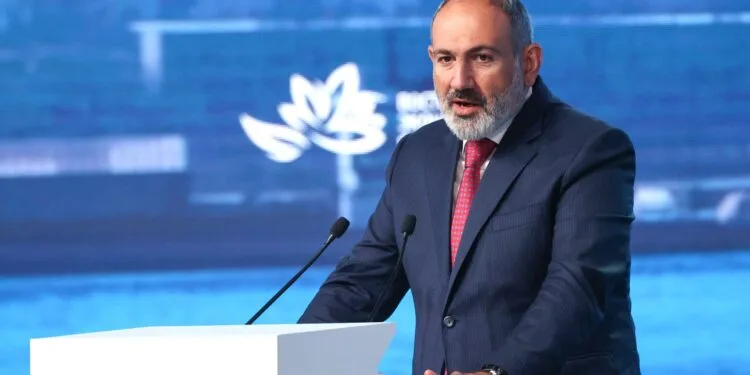Brussels – The more than 30-year-long conflict between Armenia and Azerbaijan may be heading toward a conclusion that, if reached, would certainly be historic. However, unresolved problems remain on the road to complete pacification between Yerevan and Baku, starting with the long-standing border issue and the rearmament of both countries. Thus, in an area where various international players’ political influences and strategic interests are intertwined, the long-sought, lasting solution may not yet be within reach.
During a press conference last August 31, Armenian premier Nikol Pashinyan announced that he sent Baku a proposal for the stipulation of a peace treaty that could put an end to the conflict between the two South Caucasus countries that began thirty-six years ago, in 1988 (even before the dissolution of the USSR) and centred around the contested sovereignty over the Nagorno-Karabakh area. After several phases of warfare, alternating with periods of relative stability in which the conflict seemed frozen, Azerbaijan, in the fall of 2023, militarily reconquered the Armenian enclave within its borders.
According to Pashinyan’s advance, the draft would include 17 articles: on 13, there would already be “total agreement” by the two sides, while on three others, there would be “partial agreement.” Agreement on one last point would thus be missing, but it has not been explained which issues remain unresolved (although it is not difficult to imagine this, as we will see in a moment). Yerevan’s proposal to Baku is, in essence, to sign a treaty containing the points already agreed upon and to leave the rest to a second phase of negotiations.
With the signing, the Armenian prime minister said, the two former Soviet republics would also initiate formal diplomatic relations, taking as a model the bilateral negotiations that led, last December, to the release of Armenian prisoners captured a few months earlier by the Azerbaijani army and more recently to an agreement to establish a joint border demarcation commission between the two countries. After several months in which the negotiating process seemed to stall, this is certainly a confidence boost in finding the problematic solution in a region that has not known peace for decades.
Indeed, one of the unresolved issues still has to do with the Armenian Constitution, which includes a reference to reunification between Armenia and Nagorno-Karabakh (reunification is mentioned in a document dating back to 1989, itself taken from the 1990 Declaration of Independence to which the country’s basic charter refers in a preamble). Now, Azerbaijan has repeatedly called for the removal of that reference, but it appears that only last May, Pashinyan has asked the body in charge to revise the constitution (created in 2022) to rewrite the charter entirely, to submit it to a popular referendum in 2027, even though the Armenian public opinion still does not seem to accept the final loss of the Azerbaijani region.
Another long-standing issue, which would seem to have been recently solved (or perhaps only postponed), is that of the Zangezur corridor Baku required to connect the Nakhchivan exclave to Azerbaijani territory. According to some analysts, Azerbaijani authorities made this concession to Yerevan precisely in exchange for the aforementioned constitutional changes.
But on the road to peacemaking, the rush to the rearmament of both countries also gets in the way. The Azerbaijani armed forces boast clear superiority, with Baku being supplied by Turkey, Israel, Pakistan and several European states, including Italy. At the same time, Yerevan receives weapons and military equipment from France and India. The Armenian and Azerbaijani governments publicly claim they have no intention of attacking each other, but given the region’s battered history, making predictions is far from simple.
In recent years, Armenia has been trying to move away from the Russian orbit and closer to the EU, with which it has deepened diplomatic, political, and military ties. For that matter, Brussels always encouraged the negotiation process between the two countries, even employing a peacekeeping mission on the Armenian border. As for Azerbaijan, Baku has become one of the main energy partners of the Twenty-Seven after the start of the Russian invasion of Ukraine (also from the Caucasian country comes the natural gas transported by Tap to Italy).
English version by the Translation Service of Withub
![Gli Stati del Caucaso, con l'Armenia (in rosso) al centro delle mosse europee [mappa: Wikimedia Commons. Rielaborazione: Emanuele Bonini per Eunews]](https://www.eunews.it/wp-content/uploads/2024/07/csto-map-350x250.png.webp)




